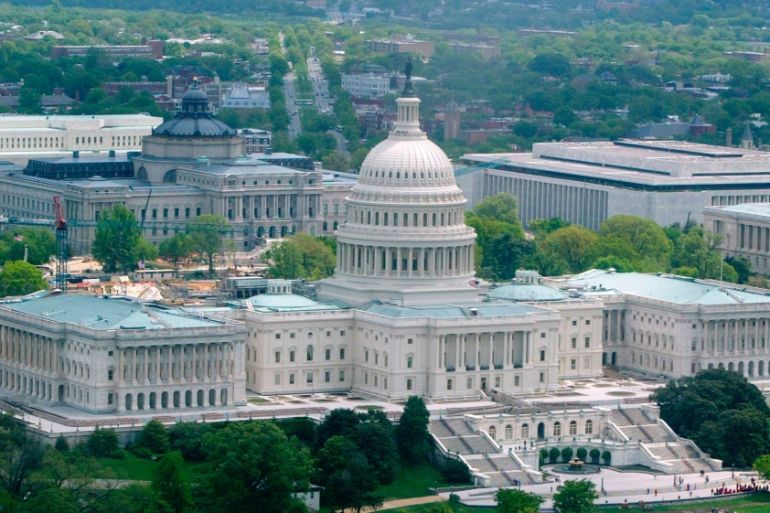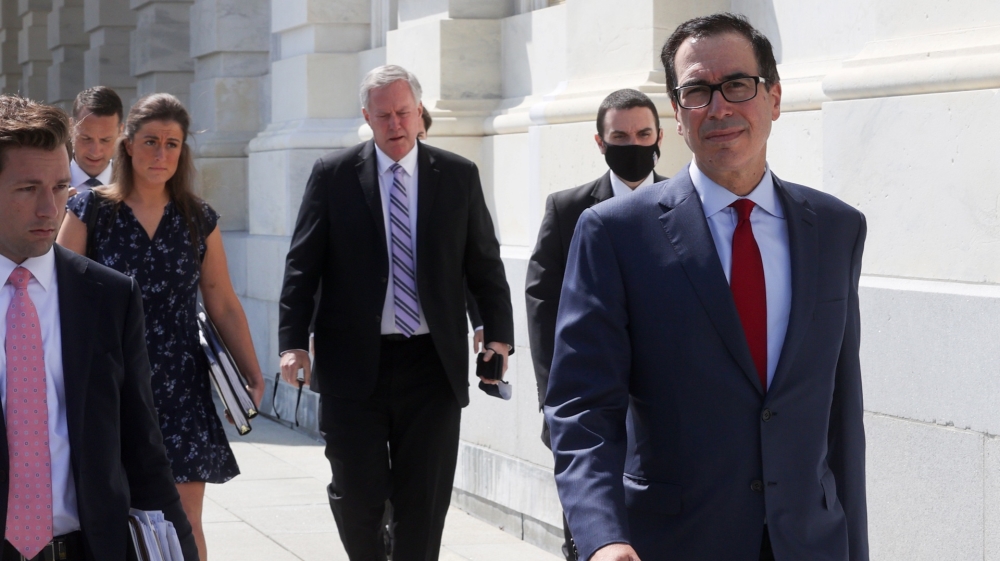Trump administration, Congress make budget deal Pence says
The agreement would keep the government funded after the end of September which is the end of the US fiscal year.

The Trump administration has reached a deal with lawmakers in Congress to ensure the United States government is funded past September 30, US Vice President Mike Pence said on Friday, removing the threat of a near-term government shutdown.
Pence told CNBC news channel the agreement reached this week by the Republican administration would keep the government funded when the fiscal year runs out at the end of the month and clear the way to focus on another coronavirus relief bill.
Keep reading
list of 4 items‘Insurrection’ should bar Donald Trump from US presidency, lawyers argue
Ex-Proud Boys leader Joseph Biggs sentenced to 17 years for US Capitol riot
Trump indictments: Key court dates set in Georgia, federal election cases
A Democratic aide in the US House of Representatives said Speaker Nancy Pelosi and Treasury Secretary Steve Mnuchin agreed this week to keep any stopgap funding bill free of controversial items.
The aide said many details of the temporary spending bill had yet to be resolved, including the duration of the funding and a long list of special changes to current law requested by the White House.
The Congress had faced a tight deadline to avoid a government shutdown as lawmakers begin returning to Washington, DC, next week, complicated by bitter conflicts between Republicans and Democrats over the next package of coronavirus aid.

The Republican-led Senate is due back on Tuesday, while the Democratic-led House plans to hold votes on bills starting the following week.
With congressional elections on November 3, both chambers have very few days left to finish work as lawmakers plan to campaign in their home states for much of October.
Congress is widely expected to pass a temporary measure mainly funding the government at current levels, leaving budget decisions for after election day.
But the issue is complicated by rancour over how best to address the coronavirus, especially amid the yawning federal budget deficit.
There had been talks of merging a funding bill with a further round of pandemic-related economic relief, but Pence’s remarks suggested the two issues would be handled separately.
President Donald Trump would have to sign off on any deal. During some past funding fights, he has reversed course on legislation he had initially signalled to support.
Many federal government operations would have to be suspended on October 1 if Congress and the White House failed to reach a deal by then for at least part of the new fiscal year.
On Wednesday, the nonpartisan Congressional Budget Office said the fiscal 2020 deficit would hit $3.3 trillion, or 16 percent of gross domestic product, fuelled by emergency pandemic aid already enacted into law.
More than $3 trillion in coronavirus relief was enacted earlier this year. But the Republican-led Senate left town last month without taking up another $3 trillion aid package the House passed in May or an alternative.
The two parties are sharply divided, but there are also disputes among Trump’s fellow Republicans. Many of the Senate’s 53 Republicans are on record opposing additional federal coronavirus relief, and most of the others want to pass a far smaller bill than the House’s.
One senior Senate Republican aide said disagreement among Republicans was so great that it was not clear whether a smaller, partisan bill could come up for a vote. Senate Democratic Leader Chuck Schumer has said he opposes a so-called “skinny” coronavirus bill and his party could block one from passing.
President Trump is running for re-election, and one-third of the 100-member Senate and all 435 House seats are up for grabs when voters head to the polls on November 3.
A government shutdown just before the elections, as the coronavirus pandemic continues, could be particularly damaging to Republican prospects since they control the White House and the Senate.
